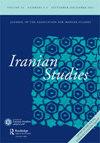From Worker-Peasant to Reluctant Revolutionary Industrial Worker in the Establishment of Iran's Copper Industry: The Sarcheshmeh Copper Mine, 1960s–1970s
IF 0.9
4区 社会学
Q2 AREA STUDIES
引用次数: 0
Abstract
Abstract This paper studies the transformation of the worker-peasant to reluctant revolutionary industrial worker during the establishment of Iran's copper industry at the Sarcheshmeh copper mine from 1966 to 1979. It explores the procedural rules implemented by mine management, such as coercion and paternalism, and the nature of the employment relationship, including methods of control, bargaining, and dispute resolution. Consideration is given to engagement of different agents with welfare policy and industrial relations, including the nature of capital, the structure of ownership, the path of traditional labor relations, and international contributors on one side and workers’ agency and their structural power in the context of evolving domestic and international environments on the other. Also highlighted is the role played by the workers’ background and economic improvement and how these factors affected their political stance during the 1979 revolution.从工农到不情愿的革命产业工人在伊朗铜工业的建立:1960 - 1970年代的Sarcheshmeh铜矿
摘要本文研究1966年至1979年伊朗Sarcheshmeh铜矿建设过程中工农向不情愿的革命产业工人的转变。它探讨了矿山管理实施的程序规则,如强迫和家长式作风,以及雇佣关系的性质,包括控制、谈判和解决争议的方法。考虑到不同的代理人参与福利政策和产业关系,包括资本的性质,所有权结构,传统劳动关系的路径,一方是国际贡献者,另一方是在不断变化的国内和国际环境背景下的工人机构及其结构权力。同时强调的是工人的背景和经济的改善所起的作用,以及这些因素如何影响他们在1979年革命中的政治立场。
本文章由计算机程序翻译,如有差异,请以英文原文为准。
求助全文
约1分钟内获得全文
求助全文
来源期刊

Iranian Studies
Multiple-
自引率
0.00%
发文量
92
期刊介绍:
Iranian Studies is a peer-reviewed journal devoted to Iranian and Persian history, literature, and society, published on behalf of the Association for Iranian Studies . Its scope includes all areas of the world with a Persian or Iranian legacy, especially Iran, Afghanistan, Central Asia and the Caucasus, and northern India, and Iranians in the diaspora. It welcomes submissions in all disciplines.
 求助内容:
求助内容: 应助结果提醒方式:
应助结果提醒方式:


